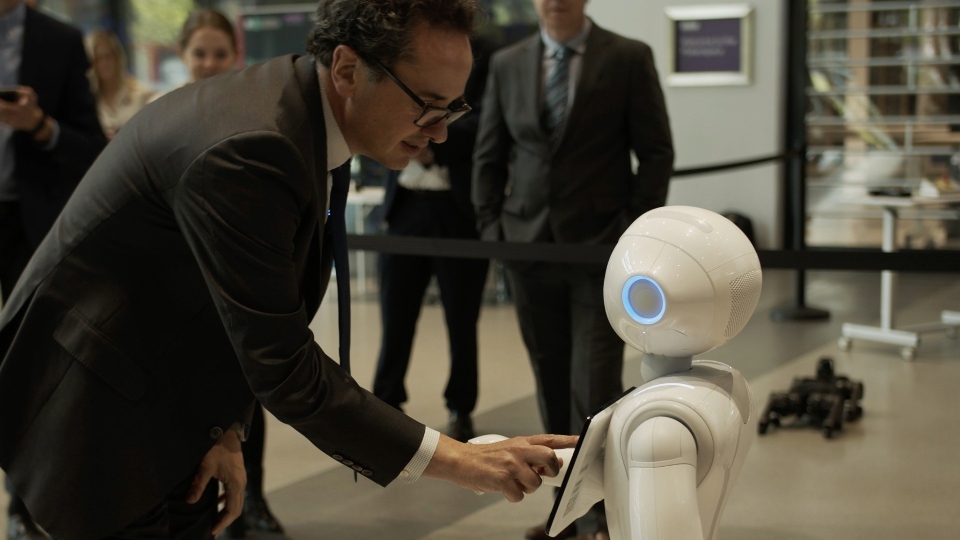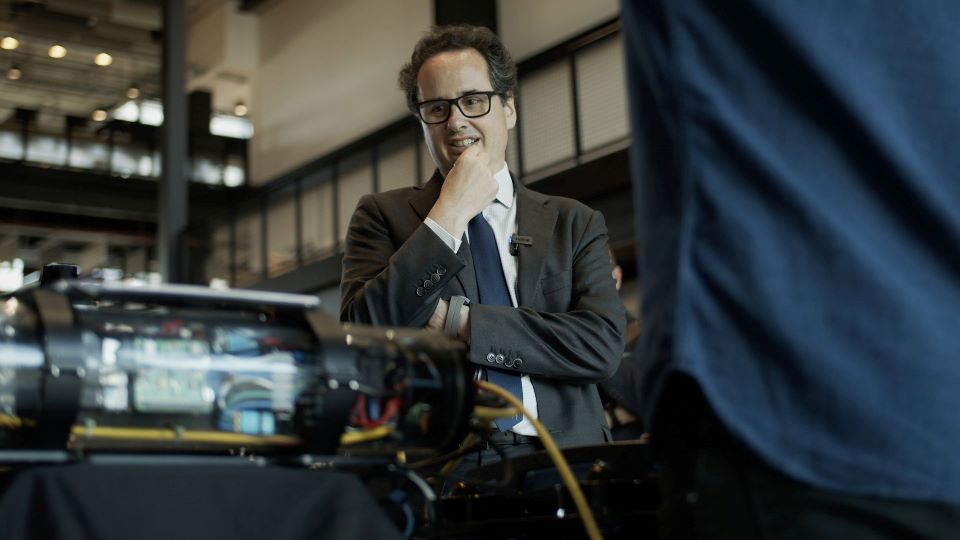‘Manchester invented modern computing - it should be at the forefront of this’
Reporter: Joseph Timan, Local Democracy Reporter
Date published: 10 September 2023

Viscount Camrose, Minister for AI and Intellectual Property, meets humanoid robot Pepper at the Manchester University Engineering Building. Images courtesy of DSIT
Climate change and poverty - these are the kind of global problems artificial intelligence (AI) could help fix, according to a government minister.
And visiting Manchester this week, he said the city should be at the forefront of this fight.
In the last year, the world has woken up to the amazing advances of AI.
This type of technology which means computers can learn, act and respond as if they are human beings is already transforming many aspects of modern life.
From virtual assistants such as Siri on our mobile phones to X-ray analysis in the NHS, we are using AI every day without even realising it.
But in its most basic form, machine learning is nothing new – in fact, the first successful AI programme which ran on a computer in Manchester was written in 1951.
Since then, computer scientists have competed to pass the test devised by wartime codebreaker and Manchester university alumnus Alan Turing which, he argued, proves whether a machine is ‘intelligent’.
In late 2022, AI software ChatGPT was said to have had passed the Turing test by fooling a human into thinking they are speaking to another human – although some dispute this.
There have been warnings about the speed at which machines are learning, but there are no signs that this ‘alarming’ rate of advance will slow down any time soon.
In Manchester, academics and businesses are embracing it – and local leaders want the success of their research to spread across the region.
There are currently 900 researchers ‘actively engaged’ in AI at the University of Manchester (UoM), including specialists such as Samuel Kaski, described by professor Richard Curry, the university’s vice-dean of research and innovation, as an ‘international leader’ in the field.
“This creates an ecosystem for companies to come and establish themselves around here,” he explained.
However, despite all of the potential AI has to offer, academics have been struggling to find funding from businesses to bring their inventions to life, according to professor Barry Lennox.
The co-director of the University’s Centre for Robotics and AI works with robots decommissioning a nuclear site.
Currently, the robots, which are used in radioactive areas within the Sellafield site in Cumbria where plutonium was produced for nuclear weapons in the 1950s, are controlled by humans using joysticks.
But Prof Lennox is now looking at how to automate some of the work that these robots do through AI.
The private sector has been funding some of this work, which is part of a 120-year project to safely close down the site.
But Barry says it has not been easy.
“We have really struggled with innovation,” he said.
“We’ve found, until recently, companies are just not ready to put in the effort that was necessary to take the robots we’re developing into industry.”
On Wednesday, Prof Lennox showed a government minister some of the ‘cutting-edge’ research into AI and Robotics at the university.
Viscount Camrose, who is the minister for AI and Intellectual Property, was taken on a tour of the Manchester University Engineering Building, which is now home to a new international research centre which is officially opening in November.
He learnt about all of the interdisciplinary research going on at the Centre for Robotic Autonomy in Demanding and Long-lasting Environments (CRADLE), which is being funded by the government to the tune of £3m, and met one of the robots built to help with nuclear infrastructure inspection named Lyra.
The minister then took a tour of the Graphene Engineering Innovation Centre (GEIC), which will also be getting around £3m of government cash, to see its energy storage labs, printing lab facilities and construction materials testing facility, before making his way to ID Manchester, where the Turing Innovation Catalyst (TIC) is located.

One of 10 projects in Greater Manchester chosen for the £33m Innovation Accelerator programme, the TIC aims to link businesses to cutting-edge AI research and technologies to help enhance productivity.
In March, the government announced that Greater Manchester would be one of three regions to get a share of a £100m pot of investment in research and development (R&D).
Of the 10 schemes selected here, three are AI-related.
Together with the TIC, the Immersive Technologies Innovation Hub in MediaCityUK and the Centre for Digital Innovation (CDI) at Manchester Metropolitan University (MMU) will also get a cut of the city-region’s £33m.
By working with local leaders, researchers and businesses, this programme is ‘more attuned to precise local needs’, Viscount Camrose said after his tour.
And if these pilots in Glasgow, Greater Manchester and the West Midlands are successful, this model of investment will spread to other places, he said.
But Richard Jones is also keen for this success to spread within the city-region.
The vice president for regional innovation and civic engagement at the UoM, has long argued that ‘rebalancing’ R&D spending is a big part of levelling up.
With almost half of government investment into R&D spent in the Golden Triangle between London, Oxford and Cambridge, he says spending more money in the north of England and the Midlands is needed for ‘quality jobs’.
But he believes that this means also investing outside of the city centre where all of the universities are based and into developments like Atom Valley, the massive industrial site planned in the north east of the city-region which promises to create around 20,000 jobs.
“At the moment, a lot of companies when they need to make a factory, they go to California and Taiwan,” he said.
“We need to make sure they come to Bury, Rochdale and Oldham.”
Home to more than 6,700 digital businesses, 200 of which already work in AI, Greater Manchester is primed to seize the opportunities these new industries present, according to the government.
Manchester council leader Bev Craig, who is the Greater Manchester Combined Authority’s Economy Lead, says the growth of the digital sector – which is now worth £5bn – was not an accident.
Working with universities, supporting local businesses and bringing in big names from around the world has sometimes come at a cost to the public purse.
But this investment has paid off, the Labour council leader argues.
“We’ve already been ahead of the curve, rivalled only by London and the south East,” she said.
“It’s not just luck of the draw that we’re here.
“The government has focused on R&D in the last couple of years, but we’re ahead of many places and we’ve got the potential to move even further.”
Born Jonathan Berry, Viscount Camrose became the minister for AI in March.
He believes this technology can help us be ‘so much better’, do ‘so much more’ and ‘solve so many more problems’.
AI is already used to find new cures for diseases, help fight fraud, increase cyber security and power self-driving cars.
But the hereditary peer’s ambitions are even grander.
“Provided we can make AI trustworthy and something people are comfortable working with, AI solves so many problems that frustrate us all today,” he said.
“The small problems as well as the big ones.
"The climate change, the poverty and so on – just solved.
“Provided we get over the trustworthiness hurdle, then I think it’s a time where we should be enormously optimistic.”
Later this year, the UK will be hosting the world’s first summit on AI safety at Bletchley Park where Alan Turing and his team broke the Enigma code during the second world war.
Viscount Camrose says Manchester will play a big role.
“Manchester invented modern computing in many ways,” he said, when asked of the city’s role in world of AI.
“It’s right it should be at the forefront of this.”
Do you have a story for us? Want to tell us about something going on in and around Oldham? Let us know by emailing news@oldham-chronicle.co.uk , calling our Oldham-based newsroom on 0161 633 2121 , tweeting us @oldhamchronicle or messaging us through our Facebook page. All contact will be treated in confidence.
Most Viewed News Stories
- 1New women-only gym opens in Chadderton
- 2New life-saving defibrillator installed at popular pub in Chadderton
- 3Stalemate at problem junction continues
- 4Fundraiser launched as 'gentle soul' David's grave remains unmarked
- 5Parents salute the school team helping children to thrive thanks to their life-changing SEND...




